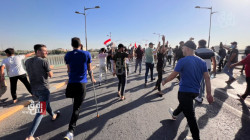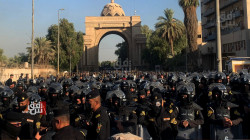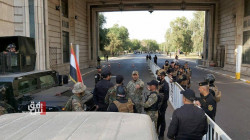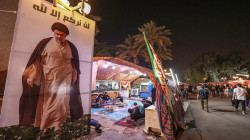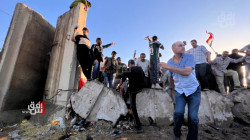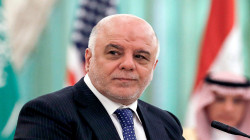MEE: Guns and troops pile into Baghdad's Green Zone as threat of violence looms
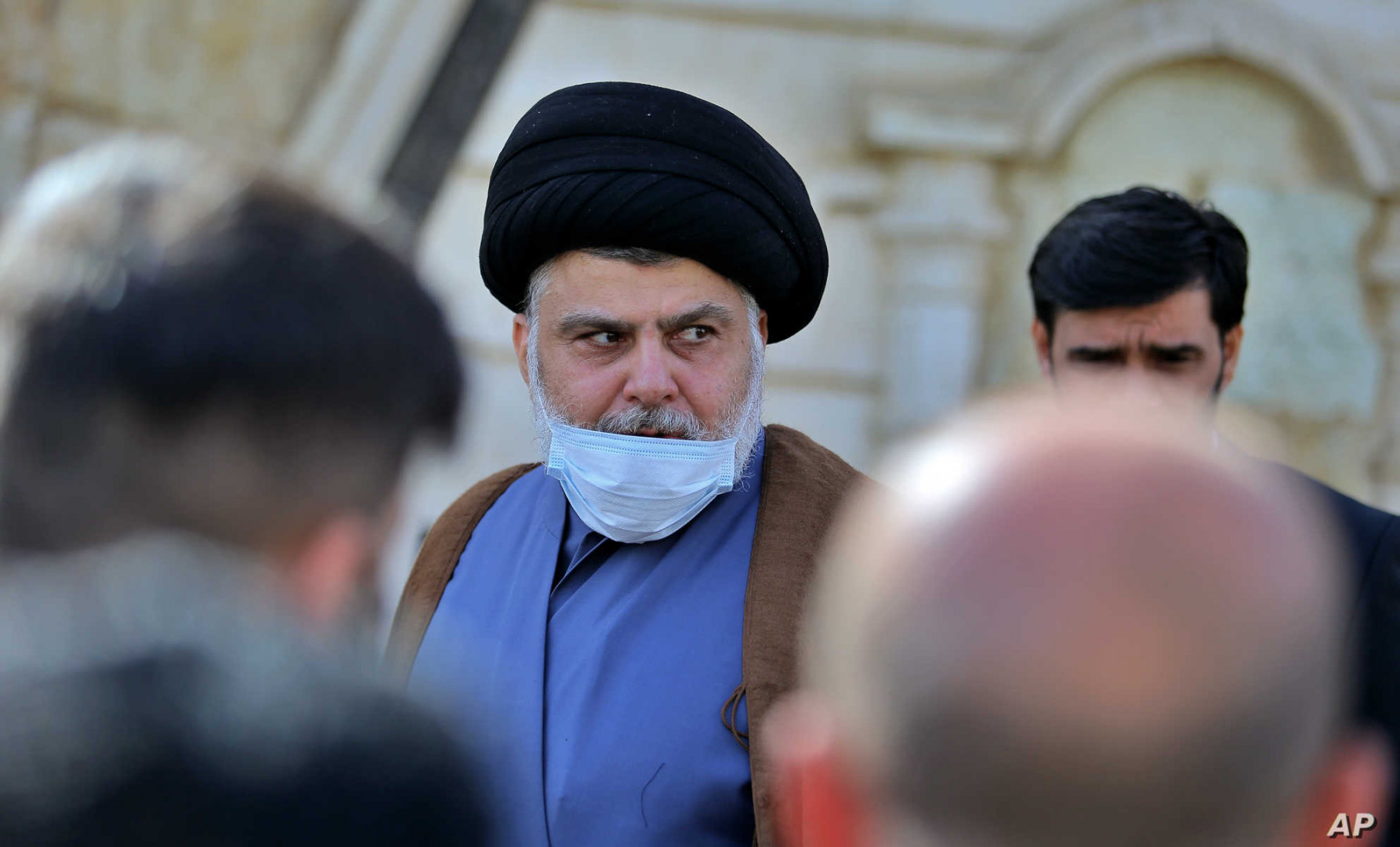
Shafaq News/ Muqtada al-Sadr no longer has many options. Armed clashes, feared but not yet witnessed, are now imminent, UK-based Middle East Eye quoted armed factions leaders and politicians.
It seems the latest escalation by the influential Shia cleric's supporters - marching on the headquarters of the judiciary - has caused considerable anger in Iraq and internationally.
Al-Sadr's followers behaved in a disciplined manner as they descended on the Supreme Judicial Council in Baghdad's fortified Green Zone on Tuesday.
They neither stormed the building nor confronted the security forces guarding it. Yet Faiq Zaidan, the council's president, responded firmly by suspending the entire judiciary in protest. He claimed threatening messages had been sent to Federal Supreme Court judges.
Al-Sadr's office ordered the protesters to back down and return to their month-long sit-in around parliament, two kilometres away, yet that did nothing to mitigate the reactions of Sadr's opponents and critics, western diplomats and Iraqi politicians told MEE.
It ended with a statement widely perceived as escalatory, in which the PMA said it felt "obligated" to end its impartiality to protect civil peace, defend the state and protect the constitution.
Several moves were agreed upon in the meeting. The commanders decided to raise the readiness of the PMA's forces in the Green Zone, adding an additional 6,000-8,000 troops to the troops already deployed in and around the district.
They also decided to increase coordination with the rest of the security forces deployed in the Green Zone, approving a joint and proactive security plan to confront any escalation by Sadr's followers there.
"At the beginning, our decision was not to interfere," said a senior PMA official. He told MEE that members of Sadr's armed faction were among the protesters at the judiciary.
"Al-Sadr's use of Saraya al-Salam fighters to besiege the building of the Supreme Judicial Council and threaten the judges of the Federal Court with physical termination forced us to take a different position," he said.
"If he seeks [armed] confrontation, we will secure it for him," the official, who also participated in the meeting, added.
"We gave him many opportunities to retreat in order to save his face, but he went too far. We won't sit idly by and wait for his next move. Instead, we'll accelerate it and finish this game."
Several PMA officials told MEE that 1,700 Saraya al-Salam fighters have been withdrawn from Samarra, 100km north of Baghdad, over the past few weeks.
Half of them were sent to southern Iraq's Najaf to secure Sadr's residence in the al-Hanana neighbourhood, while the rest were deployed inside the Green Zone to secure and sustain the Sadrist sit-in, where demonstrators are demanding fresh elections after Sadr's attempts to form a government failed.
Eyewitnesses, officials and PMA commanders told MEE that Sadr's fighters deployed in the Green Zone are wearing black uniform and have been using the PMA's equipment, including Toyota Hilux and Chevrolet Silverado vehicles and communications gear.
"Smart" surveillance cameras connected to the joint military operations rooms responsible for securing the Green Zone helped to identify them and their numbers, officials told MEE.
Some PMA officials and politicians said Sadrists had brought many weapons into the district using a number of their vehicles, taking advantage of the negligence of security at checkpoints "who fear the Sadrists' revenge if they subject their vehicles to inspection".
Eyewitnesses, including an MEE photographer, also said hundreds of Saraya al-Salam fighters and their commanders were at the judiciary on Tuesday. The fighters formed a separating cordon between al-Sadr's followers and the Special Division forces who were deployed near the parliament and cabinet offices.
Another group of Saraya al-Salam fighters stood between Sadrist followers and the Judiciary Council building.
Saraya al-Salam commanders could be identified by their Hytera radio transceivers, which the PMA distributes to its officers, but most of their vehicles were unmarked and had no number plates.
Neither the Saraya al-Salam nor Special Division fighters were armed, but the commanders and their security were carrying handguns, eyewitnesses said
Two Saraya al-Salam leaders and a Sadrist leader close to the cleric told MEE that some of their fighters and commanders have been deployed inside the Green Zone from the first day of the sit-in on 30 July "to provide logistical support", but they denied bringing any weapons into the area.
"Our orders are strict with regard to carrying weapons or using them inside the Green Zone. We did not allow any of the protesters or fighters to even carry sticks," a prominent Saraya al-Salam commander involved in supervising the sit-in told MEE.
"Our orders are strict with regard to carrying weapons or using them inside the Green Zone. We did not allow any of the protesters or fighters to even carry sticks," a prominent Saraya al-Salam commander involved in supervising the sit-in told MEE.
"It is ridiculous to promote the rumour that our fighters and youth carry weapons or even bring them into the sit-in area. If we wanted, we would do so, but we will not violate Sadr's orders, and he was clear in this regard."
The commander denied withdrawing any forces from Samarra or even having the need to send them to Najaf.
However, sources told MEE that those close to Sadr are very concerned about possible attacks on the cleric at his Najaf residence.
Precautionary measures have been taken to secure Najaf's old city, where the majority of Iraq's senior Shia clergy are located, including al-Sadr.
Al-Sadr has been on a collision course with his Iranian-backed rivals ever since emerging from last October's parliamentary election with the largest number of seats and trying to form a government with his Kurdish and Sunni allies that would freeze them out.
The Shia factions opposed to him, which have grouped in the Coordination Framework alliance, managed to frustrate him so much that Sadr ordered his MPs to resign, which handed the initiative to his rivals rather than upturning the table to his benefit.
So he escalated things further, sending his supporters to camp out at the parliament building, demanding new elections.
Since then, the Coordination Framework's parties and armed factions have sought to avoid a direct collision with Sadr. But behind the scenes some of them have from time to time been keen to provoke him and encourage more mistakes that could strip the cleric of his domestic and international support, politicians told MEE.
"Confronting Sadr directly was not an option on the table of the leaders of the Coordination Framework. That would be stupid if we take into account the numerical superiority he achieved inside the parliament and the local and international support he enjoys outside it," a prominent leader of the alliance told MEE.
"The alternative was to fight the battle away from him, targeting his Kurdish and Sunni allies, while exploiting any opportunity that loomed on the horizon to strengthen his arrogance and push him to commit more mistakes."
While the Framework leader said the policy had always been to react to Sadr's actions, "the problem now is that Sadr is trapped in a dead end, and he has no choice but to step forward and be politically eliminated, or to retreat".
"Therefore, the reaction policy that we adopted earlier is no longer appropriate, and we have to reverse the equation now," he said.
is not just the paramilitaries of the PMA and Sadrists who are on high alert.
By Wednesday morning, thousands of special forces, counterterrorism forces and PMA crack troops had been deployed in the Green Zone and neighbouring districts like Karrada and Jadriya, where the presidential palace is located. Meanwhile, concrete defences have sprung up around the most sensitive governmental buildings.
Security forces can be seen along all the bridges and roads leading to the Green Zone, and orders have been sent out to prevent any forces from entering Baghdad, military commanders told MEE.
"It is not clear what Sadr's next step is, but he promised a sudden escalation, so these precautionary security measures were taken," another prominent Coordination Framework leader told MEE.
"Whatever his destination this time, what happened in the parliament and the Supreme Judicial Council will not be repeated."
The Framework leader said no decision has been taken to engage with the Sadrists with violence, "but everyone supports the option of escalation with the aim of deterrence".
"The goal is to stop Sadr's use of the street [the public], not to drag him into a military confrontation. There is no sane person who supports the option of a military confrontation."
The PMA commanders' decision on Tuesday to escalate does not seem to have the support of all Shia forces.
After the PMA's statement was issued, Hadi al-Amiri, the leader of the al-Fatah bloc and one of the key leaders of the Coordination Framework, contacted Faleh al-Fayyad, the head of the PMA, to express his anger and rejection of the statement, a source close to Fayyad told MEE.
Meanwhile Zaidan, President Barham Salih, Parliament Speaker Mohammed al-Halbousi and Prime Minister Mustafa al-Kadhimi came together to demand that all security forces keep out of the political conflict.
"Shia-Shia fighting is a red line, we will not allow it to be crossed. The Popular Mobilisation forces will not interfere in this conflict except in the case of self-defence," another senior Coordination Framework leader told MEE.
"The PMA is there to defend the state and state institutions, and we will not allow it to be used by anyone in political conflicts. We will not allow it to interfere, neither in favour of the Sadrist movement nor the Coordination Framework."
The leader argued that the PMA needs to be a deterrent, even for the forces that are included in it.
Though Shia-on-Shia fighting is a line that everyone fears will unleash hell if crossed, clerics and politicians close to Grand Ayatollah Ali al-Sistani, the top Shia religious figure in Iraq, have played down the risk.
"All available information and signs indicate that the current escalation is under control, that it is part of the pressure tools that both parties exert on each other," a source close to Sistani told MEE.
"Our assessment of the situation is that the clash will take place, but it will be limited. This will be the result of the tense rhetoric."
(MEE)
